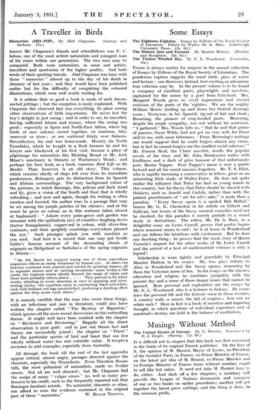Some Essays THERE is always matter for surprise in the
annual collection of Essays by Fellows of the Royal Society of Literature. The ponderous caption suggests the usual table, glass of water and lecture : one discovers, instead, how exciting an adventure true criticism may be. In the present volume is to be found a company of excellent poets, playwrights and novelists, captained for the nonce by a poet from Fairyland. Mrs. Margaret Woods gives us vivid impressions and shrewd criticism of the poets of the 'eighties. We see the mighty William Morris striding up and down her Oxford drawing- room ; Tennyson, in his Spanish rig-out of hat and cloak Browning, the pioneer of crop-headed poets. Browning, despite his ample sympathy, was not without his aversions. " I gathered," Mrs. Woods tells us, " that he and that prince of poseurs, Oscar Wilde, had not got on very well, for Oscar said to me, with some bitterness, ' From Browning's writings one would suppose that he could forgive almost any crime, but in fact he cannot forgive one the smallest social solecism.' " Mr. Forrest Reid, the Ulster novelist, recalls the popular novels of the time, and Mr. John Drinkwatcr writes with kindliness and a dash of grim humour of that unfortunate poet, Martin Tupper. Poor Tupper's name is now a poetic byword and all his sound maxims forgotten. Mr. T. S. Eliot, who is rapidly becoming a conservative in letters, gives us an interesting little study of Walter Pater. He does not quite realize the influence that Pater has had on young minds in this country, but his theory that Pater should be classed with thinkers, such as Arnold and Carlyle, rather than with the patient practitioners of " art for art's sake," is more than a paradox. " Every Savoy opera is a spoiled Bab Ballad " booms Mr. G. K. Chesterton in his article on Gilbert and Sullivan,. but lovers of the Savoy musical comedies need not be shocked, for this paradox is merely prelude to a sound study in derivations.. The editor, Mr. De la Marc, in a 'delightful essay on Lewis Carroll, proves that poetry begins where nonsense seems to end : he is at home in Wonderland and one follows his intuitions with excitement. But he does one shocking thing : he proves that the stock story of.Queen Victoria's request for . the other works of Mr. Lewis Carroll and the arrival of a host of mathematical volumes is only a legend !
Scholarship is worn .lightly and gracefully by Principal Maurice Hutton in his essays. He, too, pays tribute. to Alice in Wonderland and the Savoy operas, measuring by them the Victorian sense of fun. In his essays on the classics, education and religion, he combines sympathy with the present day and a sense of those deeper issues that cannot be ignored. More personal and explorative are the essays by Mr. E. L. Woodward, who is a lecturer in history. He corre- lates the personal life and the historic sense in these reveries. A country walk, a sunset, the fall of empires : how can we relate such ? Here in fact is a book of sensitive and inquiring thought, in which questions of individual experience and of mankind's destiny are held in the balance of meditation.






































 Previous page
Previous page